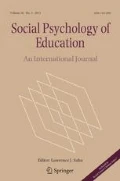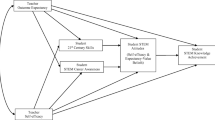Abstract
This study indicates that values are statistically significant precursors to approaches to learning in a cohort of predominantly Bulgarian, German and Romanian students studying at a German university where the language of instruction in all subject areas is English. Values have been measured with the Portrait Values Questionnaire (Schwartz et al. 2001), and approaches to learning have been assessed by the Study Process Questionnaire (Biggs, 1987). The relationships between values and approaches to learning have been estimated by canonical correlation analysis. Results of the analysis suggest that values can be linked to learning approaches in a situation where students have left their home countries to undertake tertiary studies in a new social, cultural and educational environment. Four distinct pairings between values and learning approaches emerge whereby: (a) self-aggrandisement is linked to the achievement learning variable, (b) conservatism relates to the surface learning variable, (c) self-directedness is linked to the deep learning variable and (d) benevolent change is related to the learning strategies variable.
Similar content being viewed by others
References
Allport F.H. (1924). Social psychology. Boston, Houghton Mifflin.
Anderson L.W., Krathwohl D.R. (Eds) (2001). A taxonomy for learning, teaching, and assessing: a revision of Bloom’s taxonomy of educational objectives. New York, Longman.
Bardi A., Schwartz S.H. (1996). Relations among socio-political values in eastern Europe: effects of the communist experience?. Political Psychology 17(3):525–549
Biggs J.B. (1976). Dimensions of study behaviour, another look at ATI. British Journal of Educational Psychology, 46, 68–80
Biggs J.B. (1987). Student approaches to learning and studying. (Research Monograph). Melbourne, Australian Council for Educational Research.
Biggs, J.B. (1990a). Asian students’ approaches to learning, implications for teaching overseas students, Keynote discussion paper. 8th Australasian tertiary learning skills and language conference, 11–13 July 1990. Queensland University of Technology, 1–51.
Biggs, J.B. (1990b). Teaching design for learning. Keynote discussion paper. HERDSA. Brisbane, 6–9 July 1990. Griffiths University.
Biggs J.B. (1992). How and why do Hong Kong students learn? Using the Learning and Study Process Questionnaires (Education paper 14). Hong Kong, Faculty of Education, University of Hong Kong.
Biggs J.B. (1993). What do inventories of students’ learning processes really measure? A theoretical review and clarification. British Journal of Educational Psychology 84:272–281
Biggs J.B. (1996a). Learning, schooling and socialization, a Chinese solution to a Western problem. In: Lau S. (eds) Growing up the Chinese way. Hong Kong, The Chinese University Press, pp 147–167
Biggs J.B. (1996b). Misperceptions of the Confucian-heritage learning culture. In: Watkins D.A., Biggs J.B. (eds) The Chinese learner: cultural, psychological and contextual influences. Hong Kong, ACER and CERC, pp 45–67
Biggs J.B. (1996c). Approaches to learning of Asian students, a multiple paradox. In: Pandey J., Sinha D. (eds.), Asian contributions to cross-cultural psychology. New Delhi, Sage, pp 180–199
Biggs J.B. (1999). What the student does for enhanced learning. Higher Education Research and Development 18(1): 57–75
Biggs J.B. (2001) Teaching across cultures. In: Salili F., Chiu C.Y., Hong Y.Y. (eds) Student motivation: the culture and context of learning (Plenum series on human exceptionality). New York, Plenum Publishers, pp 293–308
Cooley W.W., Lohnes P.R. (1971). Multivariate data analysis. New York, Wiley
Cooley W.W., Lohnes P.R. (1976). Evaluation research in education. New York, Irving Publishers
Entwistle N. (eds.) (1990). Handbook of educational ideas and practices. London, Routledge.
Entwistle N., Waterson S. (1988). Approaches to studying and levels of processing in university students. British Journal of Educational Psychology 58:258–265
Feather N.T. (1975). Values in education and society. New York, The Free Press.
Feather N.T. (1986). Value systems across cultures. International Journal of Psychology 21: 697–715
Feather N.T. (1998). Attitudes toward high achievers, self-esteem, and value priorities for Australian, American, and Canadian students. Journal of Cross-cultural Psychology 29(6): 749–759
Feather N.T. (1999). Values, achievement and justice. Studies in the psychology of deservingness. New York, Kluwer
Guttman L. (1968). A general nonmetric technique for finding the smallest coordinate space for a configuration of points. Psychometrika 33: 469–506
Keeves J.P. (1975) The home, the school and achievement in mathematics and science. Science Education 59(4): 439–460
Keeves J.P. (1986). Canonical correlation analysis. International Journal of Educational Research 10(2): 164–173
Keeves J.P., Thomson J.D. (1997). Canonical analysis. In: Keeves J.P. (Ed.) Educational research methodology and measurement, an international handbook (2nd edn.). Oxford, Pergamon, pp 461–466
Lai P., Biggs J.B. (1994). Who benefits from mastery learning? Contemporary Educational Psychology 19(1): 13–23
Lietz P. (1996). Changes in reading comprehension across cultures and over time. Münster/New York, Waxmann
Martön F. (1981). Phenomenography – describing the conceptions of the world around us. Instructional Science 10:177–200
Martön F., Dall’Alba G., Tse L.K. (1996). Memorising and understanding, the keys to the paradox?. In: Watkins D.A., Biggs J.B. (eds) The Chinese learner: cultural, psychological and contextual influences. Hong Kong, ACER and CERC, pp 69–84
Martön F., Säljö R. (1976a). On qualitative differences in learning-I, outcome and process. British Journal of Educational Psychology 46: 4–11
Martön F., Säljö R. (1976b). On qualitative differences in learning-II, Outcome as a function of the learner’s conception of the task. British Journal of Educational Psychology 46:115–127
Martön F., Watkins D., Tang C. (1997). Discontinuities and continuities in the experience of learning, an interview study of high school students in Hong Kong. Learning and Instruction 7(1): 21–48
Matthews, B. (2004). Life values and approaches to learning: a study of university students from Confucian heritage cultures. Flinders University Institute of International Education. Research Collection, Number 12. Adelaide: Shannon Research Press.
Murray-Harvey R. (1994). Learning styles and approaches to learning, distinguishing between concepts and instruments. British Journal of Educational Psychology 64: 373–388
Oppenheim A.N. (1992). Questionnaire design, interviewing and attitude measurement. London, Printer Publishers
Pedhazur E. (1997). Multiple regression in behavioral research (3rd edn.). Orlando FL, Harcourt Brace
Ramsden P. (1992). Learning to teach in higher education. London, Routledge
Ramsden P., Entwistle N.J. (1983) Effects of academic department on students approaches to studying. British Journal of Educational Psychology 51: 368–383
Rokeach M. (1973). The nature of human values. New York, The Free Press
Schmeck R.R. (1988). Strategies and styles of learning, an investigation of varied perspectives. In: Schmeck R.R. (eds) Learning strategies and style. New York, Plenum Press, pp 317–347
Schwartz S.H. (1992). Universals in the content and structure of values, theoretical advances and empirical tests in 20 countries. In: Zouma M. (eds) Advances in experimental social psychology (Vol. 25). Orland FL, Academic, pp 1–65
Schwartz S.H. (1994a). Are there universal aspects in the structure and contents of human values?. Human values and social issues, current understanding and implications for the future. Journal of Social Issues 50(4): 19–45
Schwartz S.H. (1994b). Beyond individualism and collectivism, new cultural dimensions of values. In: Kim U., Triandis H.C., Kagitcibasi C., Choi S-C., Yoon G. (eds.), Individualism and collectivism, theory, method and applications. Thousand Oaks, Sage, pp 85–119
Schwartz S.H. (1996). Value priorities and behavior: applying a theory of integrated value systems. In: Seligman C., Olson J.M., Zanna P. (eds) The psychology of values: the Ontario symposium (Vol. 8). Mahwah, NJ, Erlbaum, pp 1–24
Schwartz S.H., Bardi A. (1997) Influences of adaptation to communist rule on value priorities in Eastern Europe. Political Psychology 18(2): 385–410
Schwartz S.H., Bardi A., Bianchi G. (2000) Value adaptation to the imposition and collapse of communist regimes in East-Central Europe. In: Renshon S.A., Duckitt J. (eds) Political psychology: cultural and cross-cultural foundations. Basingstoke, England, Macmillan, pp 217–237
Schwartz S.H., Bilsky W. (1987). Toward a psychological structure of human values. Journal of Personality and Social Psychology 53: 550–562
Schwartz S.H., Bilsky W. (1990). Toward a theory of the universal content and structure of values: extensions and cross-cultural replications. Journal of Personality and Social Psychology 58(5): 878–891
Schwartz S.H., Boehnke K. (2004). Evaluating the structure of human values with confirmatory factor analysis. Journal of Research in Personality 38: 230–255
Schwartz S.H., Melech G., Lehmann A., Burgess S., Harris M., Owens V. (2001). Extending the cross-cultural validity of the theory of basic human values with a different method of measurement. Journal of Cross-cultural Psychology 32(5): 519–542
Schwartz S.H., Sagiv L. (1995). Identifying culture-specifics in the content and structure of values. Journal of Cross-cultural Psychology 26(1): 92–116
Sellin N. (1990). PLSPATH version 3.01. program manual. Hamburg, University of Hamburg, Germany
Shye S. (1997). Smallest space analysis. In: Keeves J.P. (eds) Educational research methodology and measurement, an international handbook (2nd edn.). Oxford, Pergamon, pp 677–684
Smith, P.B. & Schwartz, S.H. (1997). Values. In J.W. Berry, M.H. Segall, & C. Kagitcibasi (Eds.), Handbook of cross-cultural psychology (2nd edn.). (Vol. 3). Needham Heights, MA: Allyn and Bacon; pp. 77–118.
Spini D. (2003). Measurement equivalents of 10 value types from the Schwartz values survey across 21 countries. Journal of Cross-cultural Psychology 34(1): 3–23
Stevenson H.W., Stigler J.W. (1992). The learning gap, why our schools are failing and what we can learn from Japanese and Chinese education. New York, Touchstone
Tatsuoka M.M. (1973). Multivariate analysis in education research. In: Kerlinger F.N. (eds) Review of research in education. Itasca, Il: Peacock, pp 273–319
Van de Geer J.P. (1971). Introduction to multivariate analysis for the social sciences. San Francisco, Freeman
Vogt W.P. (1999). Dictionary of statistics and methodology: a nontechnical guide for the social sciences (2nd edn). Newbury Park, CA, Sage
Watkins D.A. (1996a). Learning theories and approaches, a cross-cultural perspective. In: Watkins D.A., Biggs J.B. (eds) The Chinese learner: cultural, psychological and contextual influences. Hong Kong, ACER and CERC, pp 3–24
Watkins D.A. (1996b). Hong Kong secondary school learners, a developmental perspective. In: Watkins D.A., Biggs J.B. (eds) The Chinese learner: Cultural, psychological and contextual influences. Hong Kong, ACER and CERC, pp 107–120
Watkins D.A. (2003) Student learning: a cross-cultural perspective. In: Keeves J.P. (eds) Handbook of educational research in the Asia-Pacific region. Dordrecht, Netherlands, Kluwer, pp 441–462
Willett J.B. (1989). Questions and answers in the measurement of change. In: Rothkopf E. (eds) Review of research in education 1988–1989, (Vol. 15). Washington, DC, American Educational Research Association, pp 345–422
Willett J.B. (1997). Change, the measurement of. In: Keeves J.P. (eds) Educational research methodology and measurement, an international handbook (2nd edn). Oxford, Pergamon, pp 327–334
Williams R.M. (1979). Changes and stability in values and value systems, a sociological perspective. In: Rokeach M. (eds) Understanding human values. New York, The Free Press, pp 15–46
Xinran (2005). Changing faces. Guardian Weekly 173(13): 16
Author information
Authors and Affiliations
Corresponding author
Additional information
The analyses for this research were conducted while the second author was a visiting scholar at the Flinders University Institute of International Education in Adelaide, South Australia. The assistance of Professor John Keeves in the implementation and interpretation of additional statistical analyses is gratefully acknowledged.
Rights and permissions
About this article
Cite this article
Matthews, B., Lietz, P. & Darmawan, I.G.N. Values and learning approaches of students at an international university. Soc Psychol Educ 10, 247–275 (2007). https://doi.org/10.1007/s11218-007-9019-x
Received:
Accepted:
Published:
Issue Date:
DOI: https://doi.org/10.1007/s11218-007-9019-x




